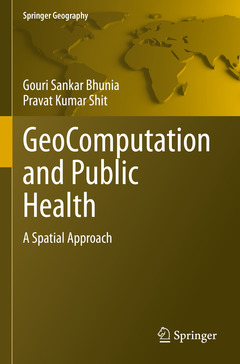Description
GeoComputation and Public Health, 1st ed. 2021
A Spatial Approach
Springer Geography Series
Authors: Bhunia Gouri Sankar, Shit Pravat Kumar
Language: English
Subjects for GeoComputation and Public Health:
Approximative price 105.49 €
In Print (Delivery period: 15 days).
Add to cartPublication date: 06-2022
298 p. · 15.5x23.5 cm · Paperback
Approximative price 147.69 €
In Print (Delivery period: 15 days).
Add to cartPublication date: 06-2021
298 p. · 15.5x23.5 cm · Hardback
Description
/li>Contents
/li>Biography
/li>Comment
/li>
GeoComputation and Public Health is fundamentally a multi-disciplinary book, which presents an overview and case studies to exemplify numerous methods and solicitations in addressing vectors borne diseases (e.g, Visceral leishmaniasis, Malaria, Filaria). This book includes a practical coverage of the use of spatial analysis techniques in vector-borne disease using open source software solutions. Environmental factors (relief characters, climatology, ecology, vegetation, water bodies etc.) and socio-economic issues (housing type & pattern, education level, economic status, income level, domestics? animals, census data, etc) are investigated at micro -level and large scale in addressing the various vector-borne disease. This book will also generate a framework for interdisciplinary discussion, latest innovations, and discoveries on public health. The first section of the book highlights the basic and principal aspects of advanced computational practices. Other sections of the book contain geo-simulation, agent-based modeling, spatio-temporal analysis, geospatial data mining, various geocomputational applications, accuracy and uncertainty of geospatial models, applications in environmental, ecological, and biological modeling and analysis in public health research. This book will be useful to the postgraduate students of geography, remote sensing, ecology, environmental sciences and research scholars, along with health professionals looking to solve grand challenges and management on public health.
Dr. Gouri Sankar Bhunia has been working in the Randstad India Private Limited, New Delhi, India. He received a Ph.D. from the Department of Geography, University of Calcutta, India, in 2015. He also worked as a visiting Faculty at Private University, West Bengal, India. His Ph.D. dissertation work focused on environmental control measures of infectious disease using Geospatial technology. Currently, he is involved in smart city and urban planning projects. His research interests include environmental modelling, risk assessment, natural resources mapping and modelling, data mining and information retrieval using geospatial technology. Dr. Bhunia is an associate editor and on the editorial boards of three international journals in Health GIS and Geosciences. Dr. Bhunia has published more than 80 articles in various Scopus indexed journals. He has published four books with International publishers.
Dr Pravat Kumar Shit is an Assistant Professor at the PG Department of Geography, Raja N. L. Khan Women’s College (Autonomous), West Bengal, India. He received his M.Sc & Ph.D. degrees in Geography from Vidyasagar University and PG Diploma in Remote Sensing & GIS from Sambalpur University. His research interests include applied geomorphology, soil erosion, groundwater, forest resources, wetland ecosystem, environmental contaminants & pollution, and natural resources mapping & modeling. He has published eight books (five books with Springer) and more than 60 papers in peer-reviewed journals. He is currently the editor of the GIScience and Geo-environmental Modelling (GGM) Book Series, Springer-Nature.
Includes the practical coverage of the use of open source software solution in public health problems, particularly in vector borne disease control
Provides suitable geocomputational techniques to be considered for spatial analyzing the geographical distribution and trend of diseases
Investigates environmental factors and socio-economic issues at micro and local level in addressing the various vector borne disease using geocomputational techniques




